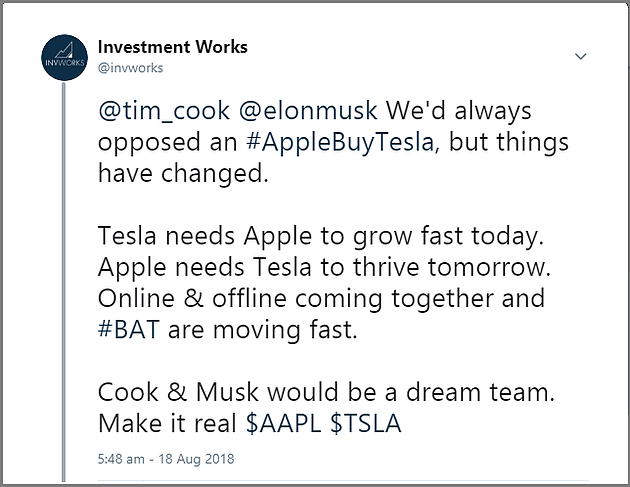In the past, we have dismissed the idea of a business combination between Apple (AAPL) and Tesla (TSLA) on the basis that each company was better off on its own. We also have doubts that Tesla’s Founder, CEO and main shareholder Elon Musk would have indulged.
But things have changed to the point where Apple buying Tesla could make all the sense in the world.
And with Elon looking to escape the short-term scrutiny of public markets and shareholders advocating for some operational support, he may be willing to consent.
We are very familiar with both companies, having been shareholders through the IW Portfolio for years.
In this article, we argue that a combined entity would be more valuable than the sum of the parts, given numerous synergies and that each company has exactly what the other most needs.
While there isn’t the minimum evidence about a deal in the making and we think chances are slim, we hope shareholders in either name will find value in the article, since by highlighting what each company needs most, we will also be pointing to their main vulnerabilities.
Before moving on: we have been first to advocate for #AppleBuyTesla after Tesla’s go-private intentions were made public. We are happy to see that in the meantime, Gerber Kawasaki and others have joined our voice.

Our original #AppleBuyTesla tweet, an idea that came to mind after envisioning Tim Cook as Tesla’s ideal operational counterweight (source: Twitter @invworks)
The rationale
Apple is trading at all-time highs, its market capitalization exceeding $1 trillion. Its consumer ecosystem is the most valuable in the world. It is easy to picture a festive atmosphere in beautiful Apple Park.
But the company should not rest on its laurels. Apple is a $1 trillion+ company thanks to decisions taken a decade ago—the acquisition of PA Semi in 2008 comes to mind—, and much, much earlier than that.
Competition is coming strong too: Alphabet’s (GOOG) (GOOGL) and Amazon’s (AMZN) ambitions are increasingly entering into Apple’s core smart device and content turf. Chinese device makers Xiaomi (XI), Huawei, Lenovo (LNVGY) (LNVGF) and ZTE are getting smarter every year.
In autonomous transportation, the progress of Apple’s in-house Project Titan is uncertain. Meanwhile, competitors are moving fast. Google’s Waymo is going to be first-to-market with a geofenced robotaxi fleet. In China, the BAT —Baidu (BIDU), Alibaba (BABA) and Tencent (TCEHY) (TCTZF)— are all testing self-driving cars, with Baidu’s Apollo, officially supported by the Chinese Government, ahead of the pack.
And it doesn’t end in autonomous systems. Tencent has taken equity stakes in electric vehicle makers Tesla and Chinese NIO. Alibaba, in start-up Xiaopeng Motors. Baidu, in WM Motor Technology and NIO.
They envision a future in which autonomous electrical transportation, logistics, retail, finance, entertainment and social are seamlessly combined into a whole. They want their tech ecosystems to cover all links in that future and are willing to take the necessary steps.
Now, we don’t know much about the scope and progress of Apple’s automotive project. Rumor has it that they will not be ready to go to market before 2023 at the earliest. That is 5 years later than Google’s Waymo and likely 3 years later than Tesla. If they are really doing meaningful progress and are confident to come out with a differentiated solution, then there would not be a case for Apple buying Tesla.
But if that is not the case, Apple beware. One or two decades from now, Apple’s mighty ecosystem, despite its strengths in smart devices, content and payments may appear inadequate, unable to close the loop with the physical world. For a company that has made of seamless integration one of its core strengths, filling the autonomous transportation void with partnerships would be underwhelming.








Leave A Comment